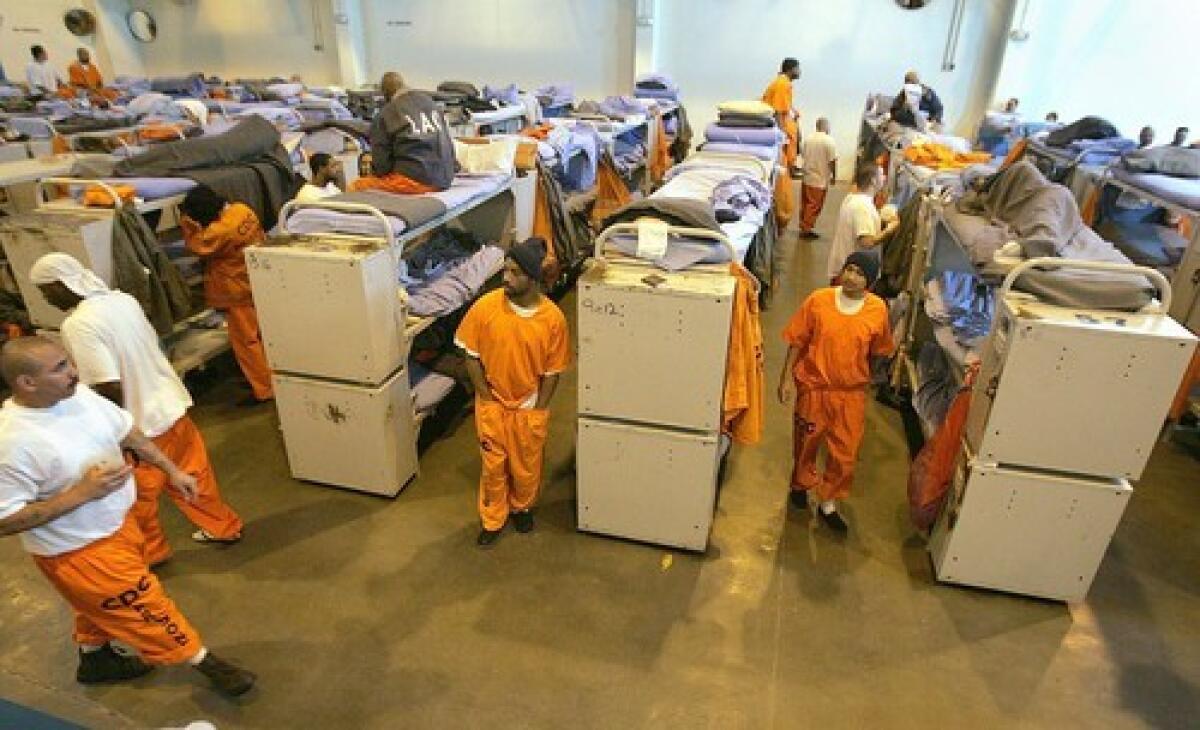California Legislature on the verge of major achievements

- Share via
From Sacramento — The Legislature is on the verge of two major achievements -- on prisons and water -- if lawmakers can be calm and rational during the final week of this year’s regular session.
That means cooling the heated rhetoric -- particularly the staff-produced nastiness -- and sustaining an amiable climate for compromise.
It also means settling for the merely significant rather than insisting on the spectacular. It’s about what is politically feasible, not what’s pure fantasy.
Gov. Arnold Schwarzenegger will need to be a partner, if not a leader. Incrementalism goes against his nature. He’s a giant-leap type of guy. But he’s also a lame duck running out of room. Leaps may no longer be possible, if they ever were.
After all, one of Schwarzenegger’s proudest accomplishments -- lowering workers’ compensation costs for business in his rookie year -- was partly the result of incrementalism begun under Gov. Gray Davis.
Besides prisons and water, there’s another important bill with long-term consequences that’s nearing passage. It’s about renewable energy.
Under the measure, by Sen. Joe Simitian (D-Palo Alto), 33% of the electricity produced by California utilities by 2020 would have to come from renewable energy sources. The fight is over how much of the renewable energy could be generated out of state. Labor unions are pushing for mostly in-state generation, as is Senate leader Darrell Steinberg (D-Sacramento).
Renewable energy “ought to be a California industry,” he says.
The big trophies for the Legislature, however, would be prisons and water:
* Prisons. The goal is threefold: to reform a system that has the worst-in-the-nation recidivism rate -- 70% -- for inmates released from prison. To begin substantially reducing the overcrowded prison population before federal courts do, as they’ve threatened. And to save the $1.2-billion already slashed from the prison budget on paper, but not in reality.
There apparently will be no compromising with Republicans. They’re having no part of it, playing the law-and-order card as they have for decades -- advocating long lockups but opposing any tax increases to pay for the bulging prisons.
“Don’t vote for the time unless you’ll spend the dime,” admonishes former Assembly Republican leader Pat Nolan of Glendale. Nolan’s an expert on politics and prisons. In the 1980s, he was a self-described “tough-on-crime” legislator. Then he was convicted on a corruption charge and spent 29 months in federal custody. Now he’s a prison reformer.
“The biggest mistake California conservatives make is not looking at corrections as just another part of the budget,” he says. “It’s like national-level Republicans voting for defense systems without looking for cost-effectiveness. . . .
“I equated tough on crime with safer streets. But Californians are no safer than residents of states that have cut prison populations.”
One thing that’s needed, he and other reformers contend, is more education, drug rehab and job training for inmates. Another is a better parole system. A scaled-down bill passed by the Assembly on Monday seeks to encourage the former and achieve the latter.
Inmates could earn credits toward earlier release by completing ed, rehab and job courses, assuming California’s prison’s had enough money and space to offer them. And high-risk parolees would get tighter supervision. Low-risk ex-cons who hadn’t committed a serious offense would be on their own and not subject to re-incarceration for parole violations. They’d only be sent back for committing another crime.
Matthew Cate, the state’s prison boss, calls these “excellent reforms.” But he says they don’t solve “the long-term overcrowding problem” and leave a $230-million budget hole.
Schwarzenegger and Cate favor a Senate-passed bill that includes alternative custody -- the ability to transfer the fragile elderly and low-risk inmates with less than a year left on their sentences to home detention with GPS monitoring.
Steinberg and Assembly Speaker Karen Bass (D-Los Angeles) are trying to restore much of the Senate version, which also included an independent commission to update California’s sentencing structure. But their problem is Assembly Democrats. Some are scared of being portrayed as a crime softie by a future campaign opponent. Steinberg took a shot at them Tuesday.
“It’s time to say, ‘Come on,’ ” the Senate leader told reporters. “We have a law-and-order Republican governor who is willing to sign a comprehensive package with absolutely essential reforms that protects public safety. It’s time to get real.
“We all get politics and everybody has ambition. . . . But we have a job to do here.”
Steinberg and Bass may coax more votes from the skittish Democrats.
But if they can’t, the good-time incentives and parole improvements alone would be worth passing. They’d mark substantial progress toward prison reform.
* Water. Steinberg says this is his “biggest priority” -- “absolutely essential for California” and “the best opportunity we have to show we can do something big.”
Bass concurs: “After deficit, deficit, deficit, water is important psychologically. It’s important that we come out of this with a significant victory and water would do it.”
The water bill will be shaped by a two-house panel that began meeting Wednesday.
The goal is many-fold. But the most important is to restore the ecosystem and remodel the plumbing of the collapsing Sacramento-San Joaquin Delta, the hub of California’s waterworks. To do that, Democrats want to create an independent governing body.
Conservation and new water storage -- underground and reservoirs -- will be part of any package.
And a key sticking point will be over who pays -- water users, mostly, but also taxpayers through bonds.
Any compromise will require a relatively small bond, at least initially -- certainly not in the $11-billion range Schwarzenegger previously has proposed.
Incremental steps are better than standing still or falling backward.
More to Read
Sign up for Essential California
The most important California stories and recommendations in your inbox every morning.
You may occasionally receive promotional content from the Los Angeles Times.











